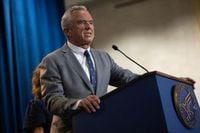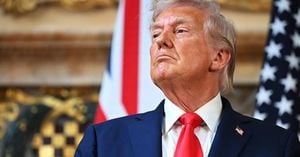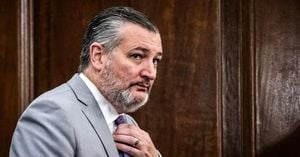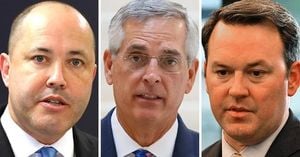In the wake of a devastating school shooting in Minneapolis, a fierce national debate has erupted over the root causes of mass violence in America. The conversation, already fraught with tension, intensified after Health and Human Services Secretary Robert F. Kennedy Jr. announced a new federal investigation into whether psychiatric medications, specifically antidepressants known as selective serotonin reuptake inhibitors (SSRIs), might be contributing to such tragedies. Kennedy’s remarks, made during a Fox News appearance on August 28, 2025, came just a day after the attack at Annunciation Catholic Church and School, in which 23-year-old Robin Westman killed two children and injured 18 others.
The attack left the Minneapolis community reeling. Westman’s handwritten journal, which surfaced online in the aftermath, revealed deep struggles with mental health and gender identity. The journal included documented suicidal and homicidal thoughts, according to reports cited by MEAWW. While it remains unclear whether Westman was taking psychiatric medications at the time of the shooting, the mere suggestion of a link between such drugs and violent behavior immediately ignited controversy.
During his Fox & Friends interview, Kennedy stated, “We are doing those kinds of studies now at NIH. We’re launching studies on potential contribution of some of the SSRI drugs and some of the other psychiatric drugs that might be contributing to violence.” He emphasized the seriousness of the inquiry, noting, “Many of them … had black box warnings that warn of suicidal ideation and homicidal ideation. So we can’t exclude those as a culprit and those are the kind of studies we’re doing.” Kennedy added, “There are black box warnings on some of these psychiatric drugs that warn … in clinical trials that they saw suicidal and homicidal ideation. We are going into that with an open mind.”
But for many, including prominent lawmakers, Kennedy’s focus on medication was a step too far. Minnesota Senator Tina Smith, a Democrat, took to social media to express her outrage. Her words were pointed and personal: “I dare you to go to Annunciation School and tell our grieving community, in effect, guns don’t kill kids, antidepressants do.” She didn’t stop there, adding, “Just shut up. Stop peddling bulls**t. You should be fired.” Smith’s comments, which quickly went viral, reflected a deep frustration with what she and others see as a diversion from the real issue—America’s unique relationship with guns.
“There are 400 million guns in this country. More guns than people,” Smith wrote in a follow-up post. “In America, we are ten times more likely to be shot in a school or playground than any other developed nation.” Her remarks echoed a widely held sentiment among gun control advocates: that focusing on mental health or medication, while important, risks overshadowing the urgent need for gun reform.
The online response to this high-profile clash was swift and polarized. On one side, some users supported Kennedy’s call for further research, writing comments like, “Good. Drugs can be so dangerous and lead to such unexpected consequences.” This camp sees the investigation as a necessary step in understanding all possible contributors to mass violence, not just firearms.
Others, however, were scathing in their criticism. One social media user summarized the concern many mental health advocates share: “Suggesting psychiatric medications may cause violence reinforces harmful myths about mental illness and undermines treatment access. By focusing on medication, Kennedy sidesteps the policy debate around gun regulation and public safety.” Another wrote, “So he sees another mass shooting and thinks antidepressants are the problem, not deranged people having access to assault rifles. How is this guy in charge of health policy?”
Still, some pushed back against Smith’s gun-centered arguments. “How will you stop mentally ill people from obtaining illegal guns? Did prohibition stop drinking?” asked one commenter. Another posed a rhetorical question: “Out of those 400 million guns, how many are out there killing people without some psychopath pulling the trigger? That’s. The. Point.” The thread of the debate made one thing clear: Americans remain sharply divided not only on the causes of mass shootings, but also on the best path forward.
Adding another layer to the discourse, the shooter’s gender identity became a flashpoint. Conservative commentators suggested that transition-related medications might play a role in violent incidents, a theory that Kennedy was asked about directly on Fox News. Minneapolis Mayor Jacob Frey condemned such speculation, warning against attempts to “vilify the transgender community or marginalized groups” in the aftermath of tragedy. Frey’s call for empathy and understanding underscored the risk of further stigmatizing vulnerable populations during moments of national grief.
Kennedy, whose tenure as HHS Secretary has been marked by controversy—including his past views on vaccines and a contentious effort to remove CDC Director Susan Monarez—insisted that his agency’s investigation would proceed with scientific rigor and an “open mind.” He argued that while firearms have long been part of American culture, something fundamental has shifted in recent decades. “People have possessed guns throughout American history,” Kennedy said, “but something profound has changed in modern times, altering human behavior.” He maintains that the nation’s extensive use of psychiatric medication deserves scrutiny as part of the broader conversation about violence.
Yet critics point to research that casts doubt on the medication-violence connection. A 2019 study, cited by several outlets, found that most school shooters had not been prescribed psychotropic drugs, and when there were prescriptions, no causal relationship was established. For these critics, Kennedy’s investigation risks reviving old myths and distracting from evidence-based solutions to gun violence.
The tragedy at Annunciation Catholic School has once again forced the nation to grapple with uncomfortable questions about mental health, gun access, and social responsibility. As the Minneapolis community mourns and the country debates, the search for answers—and accountability—continues. The only certainty is that the wounds left by such violence are deep, and the path to healing remains fraught with disagreement over what, or whom, is truly to blame.
In the end, the Annunciation shooting stands as a stark reminder of the complex web of issues—policy, medicine, culture, and identity—that underpins America’s ongoing struggle with mass violence. The debate, for all its rancor, reflects a nation desperate for solutions, but divided over where to find them.





